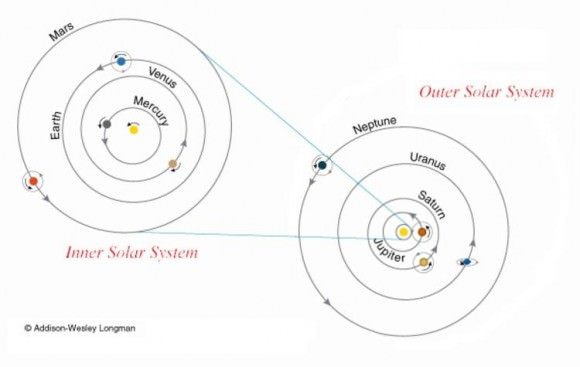We’ve all been there. You’ve met someone nice – but for some inexplicable reason, they don’t get astronomy. So how do you start gently introducing them to your life’s passion (about astronomy that is) without scaring them away?
First it’s important to recognize that not everyone will be instantly in awe to learn you own a 14-inch Schmidt-Cassegrain with four speed microslew. Weird, but there it is. And it’s going to be a challenge getting that special someone to drive out to a lonely spot in the wilderness for some proper dark sky viewing – and don’t even mention that there’s such a thing as naked eye astronomy.
Start with the Sun – it’s big and it’s obvious and everyone gets that it rises in the east and sets in the west. Well, that of course means that the Earth is actually spinning from west to east. And heck, you’re an astronomer, so you’re bound to know your cardinal directions on familiar ground – so just point. We are spinning that way.
And if you are in the right part of the lunar cycle – you might comment, on one of those romantic moonlit evenings, that last night at this time the Moon was there – and tonight it’s shifted a bit to the east. Don’t dwell on it – just put the idea out there. The next night let them note that – hey, it’s moved even further east! They might even notice that it’s filled out a bit – but this is not the time to introduce them to the word gibbous.
What’s happening is that they are starting to make their own astronomical observations. All you have to do is to find an opportune moment to pull the background together. If the Earth spinning from west to east, that means that from a perspective in space – at least from above the North Pole – it’s spinning anti-clockwise. And the fact that the Moon inches further towards the east day by day means it’s orbiting the Earth anti-clockwise.
Hopefully you’ve captured their interest enough to carry on with the fact that actually all the planets orbit the Sun in that same anticlockwise direction – indeed, even the Sun spins in that same direction, once every 28 days. A quick mention of the theory that the whole solar system formed from a gas cloud that spun down into a disk – and it’s probably time to move on to another conservation topic. This is not the time to introduce them to the conservation of angular momentum. Pace yourself.
 From here – a wealth of discussion could arise in the days to come. Your potential new partner might ponder whether all the planets spin in the same direction – to which you can reply well mostly, except for Venus and Uranus – and then you’re away talking about planetary collisions. Or, maybe you’ll be asked whether all the planet’s moons orbit in the same direction – to which you can reply well mostly, but there’s Triton that goes the wrong way around Neptune – probably because it came in from the Kuiper Belt. There’s a Kuiper Belt now?
From here – a wealth of discussion could arise in the days to come. Your potential new partner might ponder whether all the planets spin in the same direction – to which you can reply well mostly, except for Venus and Uranus – and then you’re away talking about planetary collisions. Or, maybe you’ll be asked whether all the planet’s moons orbit in the same direction – to which you can reply well mostly, but there’s Triton that goes the wrong way around Neptune – probably because it came in from the Kuiper Belt. There’s a Kuiper Belt now?
Good luck.


I dare anyone to bring up the Uranus thread again.
To the point, some god-knows how many years ago I went into this rant about how we’ve just figured out that the universe is expanding FASTER and the whole rubber-band analogy I was raised on was completely bunk, and I love to have high-school wisdom up-ended right in front of my eyes, and I got so excited over it that someone nice actually found it sexy.
I tried it again since then, but it never worked the same. Shrug. I guess the stars were aligned. har har.
I reckon you’d get absolutely NOWHERE chatting up someone if you started with what’s outlined above. Talk about the stars and history of the constellations first. Telling your girl that the moon is “now in its gibbous phase” and it’s ” now in a different position than it was yesterday” will not impress her and neither are you likely to progress any further. :-))
btw – this article is geared towards male amateur astronomers wooing clueless gals.
But it is written by a guy!
I’d like a Gal’s perspective here. Anyone?
Just show the other 1/2 half pictures you’ve took with your telescope…They’ll be wowed,As for after you have them hooked an all your time gooes back to your telescope..Good luck with that battle..heh
I’ve always found past boyfriends to be very accomodating when it comes to driving me to a dark site (even if they just sit in the car and listen to some tunes). These days I wouldn’t consider any guy unless he has a good grounding in astronomy — not even if he owns a Mercedes C230, as I now own one myself. 🙂
Meh – it all depends. Different things work for different people – I’ve found most people have a fascination with astronomy. But it’s the big questions that people like to trip out over, the exotic objects out there, and the extreme facts. One mention of black holes or neutron stars or magnetars or gamma ray bursts or practically anything to do with modern cosmology usually starts a night-long conversation with most of my (unscience-y) friends. Or mention the temperature at the core of the sun, or that some of the moons in the solar system likely harbour underground oceans. Or mention what happens when a star like our sun dies. Or that astronomers have found hundreds of planets around other stars, and are getting close to being able to detect Earth-like ones! They may harbour life… etc. That the universe is expanding, and that it seems to contain strange exotic matter and energy. Drake’s equation. Fermi’s paradox.
Obviously this isn’t first-date type stuff, but people are naturally drawn to these things if they haven’t been brainwashed into thinking that life should consist solely of Cosmo articles, celebrities and pissing it up 3 nights per weekend. And for those that aren’t naturally drawn to such things, or are at least respectful of them – why would anyone on here be keen to hook up with such a person? At least on a non-casual basis, anyway…